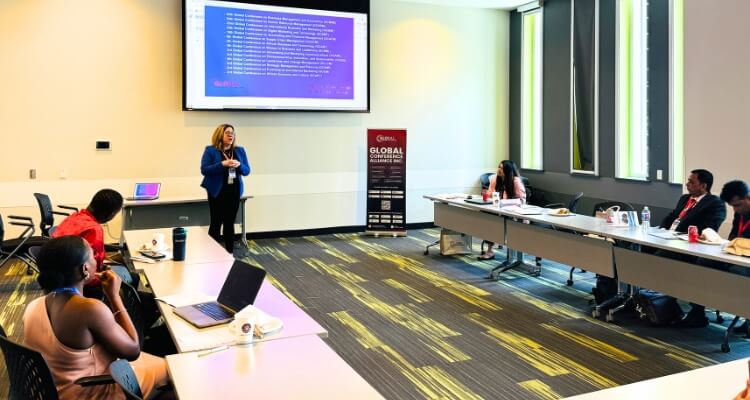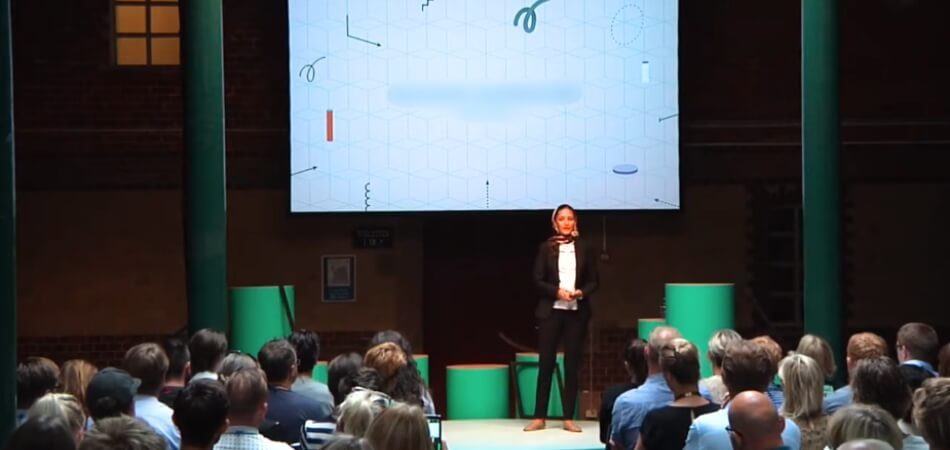Getting involved in the autism and disability studies conference in Canada is a great way to meet professionals and stay up to date with the latest developments in this field. If you are in Iran and are curious about “How to attend an autism and disability studies conference in Canada from Iran?” Here’s what you need to know.
You should begin by checking the conference schedule and completing your registration at the earliest. You’ll then need an invitation letter from the organizers to support your Canadian visa application.
As soon as your visa is confirmed, you can arrange your travel and accommodation. Be ready to dive into insightful presentations and contribute to some in-depth discussions.
If you would like to learn more about these topics, please read our detailed article.
Canadian Autism and Disability Studies Conference – What Happens There?
Every year, the Canadian autism and disability studies conference gathers professionals, researchers, and advocates. This event focuses on sharing knowledge and experiences related to autism and disability studies. Participants can expect engaging discussions and insightful presentations from leading experts in the field.
Workshops and panel sessions are essential parts of the autism and disability studies conference in Canada. These sessions allow attendees to explore various topics and gain practical skills. If you plan to attend, be ready for enriching interactions with peers.
Networking opportunities are plentiful throughout the event. Participants can connect with others who share similar interests and challenges. Building these relationships can lead to collaborations that benefit everyone involved in the community.
Can Anyone Attend the Autism and Disability Studies Conference in Canada?
Yes, Anyone Can Attend the Autism and Disability Studies Conference in Canada. Any person interested in autism or disability studies is welcome to participate in this inclusive conference. During the event, attendees gain insight from experts, participate in discussions, and engage in a collaborative environment. While the conference is open, some sessions may target specific groups for deeper understanding. The following is a detailed explanation:
Professionals in the Field
Professionals in the autism and disability fields will benefit greatly from attending. The conference offers sessions tailored to therapists, social workers, and educators. Learning current practices and emerging trends enhances their knowledge base. These professionals gain tools to support individuals with autism and disabilities.
Researchers and Academics
Researchers and academics are key participants at this conference. They present studies, gather insights, and collaborate with like-minded peers. The conference environment encourages exploring new ideas in autism and disability studies. It encourages critical discussions that shape future research directions.
Parents and Family Members
Family members can find valuable resources and support through the conference. Sessions address concerns that directly impact individuals with autism or disabilities. Families connect with professionals and other attendees for mutual support. They leave with practical strategies to support their loved ones.
Individuals with Autism and Disabilities
Self-advocates and those with lived experiences are welcome at the conference. Their insights enrich the dialogue on autism and disability issues. Workshops provide accessible resources to empower personal growth and advocacy. The event values their voices as essential contributors.
Caregivers and Support Staff
Caregivers and support staff gain practical skills and knowledge from attending. Sessions cover techniques to improve daily care for clients. Networking helps them share experiences and problem-solving strategies. Attending the conference supports their important role in the community.
Students and Aspiring Professionals
Students and emerging professionals are encouraged to participate in the conference. It offers networking and learning opportunities to boost career growth. Engaging with experts and peers provides valuable career insights. The experience helps them understand real-world applications in autism and disability fields.
How to Attend the Autism and Disability Studies Conference in Canada from Iran?
Visiting the autism and disability studies conference in Canada from Iran is possible with careful planning and preparation. This step-by-step guide will help you follow the essential steps. By following these points, you’ll be ready to enjoy an informative and enriching experience:
Step 1: Research Conference Dates and Topics
Begin by exploring the conference dates and topics that interest you most. Visit the official website to review sessions, workshops, and schedules. Planning early allows you to choose sessions best suited to your goals. Having a clear plan helps streamline the registration process.
Step 2: Complete the Registration Process
Once you decide to attend, start the registration process promptly. The conference website typically provides all the necessary forms and fee information. Registering early may also give you access to discounted rates. Timely registration secures your spot at this valuable event.
Step 3: Request an Invitation Letter from Organizers
An invitation letter is vital for your visa application to Canada. After registering, contact the conference organizers to request this document. Moreover, attending autism and disability studies conference in Canada requires this official invitation as proof. Having it ensures a smoother visa application process.
Step 4: Apply for a Canadian Visitor Visa
With the invitation letter, you can now apply for a Canadian visitor visa. Follow the visa guidelines on the official Canadian government website. Make sure to prepare all the required documents well in advance. A well-organized application boosts your chances of approval.
Step 5: Arrange Your Travel and Accommodation
Once your visa is approved, plan your travel and book accommodations near the venue. Research flights that fit your schedule and budget for convenience. Early booking ensures better deals and lodging options. A comfortable stay will contribute to your conference experience.
Step 6: Prepare for the Conference Experience
Last but not least, review the conference program and mark sessions you must attend. Familiarize yourself with speakers and topics to make the most of each day. Bring necessary materials like notebooks or digital devices for taking notes. A little preparation ensures a rewarding and engaging conference journey.
Common Mistakes to Avoid While Attending Canadian Autism and Disability Studies Conference
Making valuable connections while expanding knowledge is one of the benefits of attending the Canadian autism and disability studies conference. However, attendees often make simple mistakes that can affect their overall experience. Avoiding these common pitfalls will help you make the most of this event:
- Not Registering Early: Delaying registration can lead to missed opportunities for discounts or limited sessions. Secure your spot early to avoid disappointment.
- Failing to Plan Your Schedule: Without a schedule, you may miss key sessions that align with your interests. Organize your day to maximize your learning.
- Overlooking Networking Opportunities: Focusing only on sessions may prevent you from meeting valuable contacts. Take advantage of breaks to network and connect.
- Neglecting to Prepare for Discussions: Arriving unprepared can limit your participation in discussions. Review key topics beforehand to contribute meaningful insights during sessions.
- Ignoring Conference Updates: Important conference changes may be announced through updates. Stay informed to avoid missing adjustments in sessions or locations.
- Skipping Rest and Breaks: Exhaustion can lower your engagement and attention span. Plan breaks to stay energized and fully involved in activities.
- Not Taking Notes or Recording Insights: Relying on memory alone might cause you to forget important details. Taking notes ensures you retain key insights for later use.
- Underestimating the Value of Follow-Up: Failing to follow up with contacts can hinder future opportunities. Send messages or connect online to maintain relationships.
Best Ways to Network at a Canadian Autism and Disability Studies Conference
Networking at a Canadian autism and disability studies conference opens doors to new insights, collaborations, and friendships. By joining autism and disability conference, you can connect meaningfully with experts, advocates, and peers. Here are some effective ways to make the most of your networking experience.
Attend Pre-Conference Events
Pre-conference events are ideal for meeting attendees in a relaxed setting. These smaller events allow you to form connections early. Engage in conversations to build familiarity before the main conference starts. This initial interaction can ease future conversations during the conference.
Participate Actively in Sessions
Joining discussions during sessions is an effective way to connect with like-minded people. Ask questions that show your interest in the topic. This can spark conversations with those who share your interests. Active participation makes you more approachable and visible to other attendees.
Join Group Activities and Workshops
Workshops provide a more hands-on environment for interaction and collaboration. Use this opportunity to work closely with fellow participants. Shared activities create a bond that eases future conversations. Moreover, group learning enhances your knowledge while building strong connections.
Make Use of Social Media and Conference Apps
Many conferences use social media or apps for interaction before, during, and after the event. Follow relevant hashtags and connect with speakers online. Social platforms allow you to stay updated and engage with attendees. Through these tools, you can reconnect post-conference.
Follow Up with New Contacts
Following up with people you meet helps maintain and strengthen those connections. A brief message or email can show your appreciation. Mention any topics you discussed to keep the conversation meaningful. This simple step can lead to future collaborations or friendships.
Frequently Asked Questions (FAQs)
A first-time attendee from Iran may have some questions regarding the autism and disability studies conference in Canada. To make the conference planning process easier and more confident, we have compiled answers to frequently asked questions. Our FAQs will guide you on topics not previously addressed, ensuring you’re prepared for a rewarding experience.
What Language Is the Conference Presented In?
The autism and disability studies conference in Canada is primarily conducted in English. Attendees can expect all sessions, workshops, and materials to be in English, so basic fluency is necessary to fully engage with the presentations and discussions.
Can I Bring Family Members to The Conference?
Family members are welcome to travel with attendees but may not have access to conference events without registration. However, the conference city usually offers various activities, so family members can enjoy exploring while you attend sessions.
What Payment Methods Are Accepted for Registration Fees?
Most conferences accept a range of payment methods, including credit cards, debit cards, and online payment platforms. If you are concerned about payment options, review the registration guidelines or contact the organizers for clarity on accepted methods.
How Can I Prepare to Take Notes Effectively During Sessions?
Preparing to take effective notes includes bringing notebooks, digital devices, or even recording devices if allowed. Reviewing topics in advance can help you structure your notes better, ensuring you capture the most valuable information during the sessions.
How Early Should I Arrive at The Venue Each Day?
It’s recommended to arrive at least 30 minutes before the first session to avoid delays and find seating. Arriving early also allows you to explore the venue and review the day’s schedule in a relaxed manner.
Conclusion
The opportunity to attend the autism and disability studies conference in Canada from Iran can be enriching, if it is approached carefully. From researching conference dates to securing your registration, each step helps set a solid foundation for your journey.
The process of “How to attend the autism and disability studies conference in Canada from Iran?” involves obtaining an invitation letter, applying for a visa, and arranging accommodations well in advance.
By avoiding common pitfalls, such as neglecting networking or arriving unprepared for discussions, you’ll ensure a rewarding experience. This valuable conference enables you to connect with professionals, expand your knowledge, and gain practical tools to support the autism and disability community effectively.








